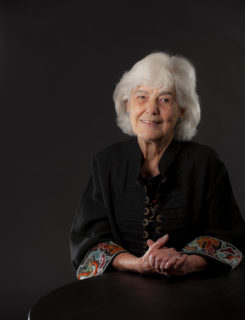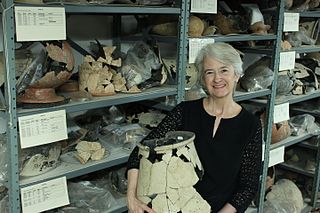Related Research Articles

The Three Sisters are the three main agricultural crops of various indigenous peoples of Central and North America: squash, maize ("corn"), and climbing beans. In a technique known as companion planting, the maize and beans are often planted together in mounds formed by hilling soil around the base of the plants each year; squash is typically planted between the mounds. The cornstalk serves as a trellis for climbing beans, the beans fix nitrogen in their root nodules and stabilize the maize in high winds, and the wide leaves of the squash plant shade the ground, keeping the soil moist and helping prevent the establishment of weeds.

The Eastern Agricultural Complex in the woodlands of eastern North America was one of about 10 independent centers of plant domestication in the pre-historic world. Incipient agriculture dates back to about 5300 BCE. By about 1800 BCE the Native Americans of the woodlands were cultivating several species of food plants, thus beginning a transition from a hunter-gatherer economy to agriculture. After 200 BCE when maize from Mexico was introduced to the Eastern Woodlands, the Native Americans of the eastern United States and adjacent Canada slowly changed from growing local indigenous plants to a maize-based agricultural economy. The cultivation of local indigenous plants other than squash and sunflower declined and was eventually abandoned. The formerly domesticated plants returned to their wild forms.
Patty Jo Watson is an American archaeologist noted for her work on Pre-Columbian Native Americans, especially in the Mammoth Cave region of Kentucky. Her early investigations focused on the origins of agriculture and pastoralism in the Near East.
Alison Wylie is a Canadian philosopher of archaeology. She is a professor of philosophy at the University of British Columbia and holds a Canada Research Chair in Philosophy of the Social and Historical Sciences.

Sarah Milledge Nelson was an American archaeologist and Distinguished Professor Emerita from the Department of Anthropology, University of Denver, United States.
Lee Ann Newsom is an Associate Professor of Anthropology at the Pennsylvania State University at University Park. She has written numerous books and articles. She was awarded a MacArthur Fellowship in 2002.
Kristen Johnson Gremillion is an American anthropologist whose areas of specialization include paleoethnobotany, origins of agriculture, the prehistory of eastern North America, human paleoecology and paleodiet, and the evolutionary theory. Currently a professor in the Department of Anthropology at the Ohio State University and editor of the Journal of Ethnobiology, she has published many journal articles on these subjects.
David G. Anderson is an archaeologist in the department of anthropology at the University of Tennessee, Knoxville, who specializes in Southeastern archaeology. His professional interests include climate change and human response, exploring the development of cultural complexity in Eastern North America, maintaining and improving the nation's Cultural Resource management (CRM) program, teaching and writing about archaeology, and developing technical and popular syntheses of archaeological research. He is the project director of the on-line Paleoindian Database of the Americas (PIDBA). and a co-director, with Joshua J. Wells, Eric C, Kansa, and Sarah Whitcher Kansa, of the Digital Index of North American Archaeology (DINAA)
Deborah M. Pearsall is an American archaeologist who specializes in paleoethnobotany. She maintains an online phytolith database. She is a full professor in the Department of Anthropology at the University of Missouri in Columbia, Missouri, where she first began working in 1978. She received her Ph.D. in anthropology from the University of Illinois at Urbana-Champaign in 1979, with a dissertation titled The Application of Ethnobotanical Techniques to the Problem of Subsistence in the Ecuadorian Formative.
Gerald F. Schroedl is a professor of anthropology at the University of Tennessee. He specializes in Southeastern United States and Caribbean prehistoric and historic archaeological sites. He is an authority on Cherokee prehistory and the archaeology of eastern Tennessee and western North Carolina.
Tristram Randolph Kidder is an American archaeologist and professor of anthropology and environmental studies at Washington University in St. Louis. His research focuses on geoarcheology, climate change, and the evolution of human societies. He has studied cultures in different parts of the world, such as the Southeastern United States as well as China. Kidder is considered an authority on human settlements in the Mississippi River Valley and has researched how they were affected by prehistoric global climate change. Kidder's grandfather, Alfred Kidder, was an archeologist who researched the southwestern U.S. and Mesoamerica during the first half of the 20th century and his uncle, Alfred Kidder, 2d, was also an archeologist. Alfred Kidder, 2d's work focused on Andean archeology, pre-Columbian art and for almost 20 years, he moderated a CBS program called What in the World?
Herbert D. G. Maschner is an American anthropologist and academic administrator. His research interests include biocomplexity and sustainability in prehistoric human ecology, warfare and inequality in prehistory, the application of Darwinian theory and evolutionary psychology to archaeology, GIS in archaeology, isotope analysis and virtual museums and repositories.
Carolyn Sargent is an American medical anthropologist who is Professor Emerita of Sociocultural Anthropology and of Women, Gender, and Sexuality Studies at Washington University in St. Louis. Sargent was the director of women's studies at Southern Methodist University from 2000-2008. Sargent served as president of the Society for Medical Anthropology for 2008-2010 and 2011-2012.

Joyce C. White is an American archaeologist, an adjunct professor of anthropology at the University of Pennsylvania, and executive director of the new Institute for Southeast Asian Archaeology. Her research primarily concerns decades-long multidisciplinary archaeological investigations in Thailand and Laos covering the prehistoric human occupation of the middle reaches of the Mekong River Basin. She is considered the world's leading expert on the UNESCO World Heritage Site of Ban Chiang, Thailand, and directs an archaeological fieldwork program in the Luang Prabang Province of Laos. She has become a strong advocate of cultural heritage preservation and has served as an expert witness in an antiquities trafficking case for the U.S. Department of Justice.
Robert Wald Sussman was an American anthropologist and professor at Washington University in St. Louis. His research concerned the evolution of primate and human behavior, and he was interested in race as a social construct. He was a fellow of the American Association for the Advancement of Science.
Fiona Marshall is an archaeologist at Washington University in St. Louis. Her methodological specialties are zooarchaeology and ethnoarchaeology. She has excavated Pastoral Neolithic sites in eastern Africa, focusing primarily on the domestication and herding of animals, particularly cattle and donkeys. She has also conducted ethnoarchaeological research on factors that affect body part representation in archaeological sites, and on foraging ways of life amongst Okiek people of the western Mau Escarpment, Kenya. She has also worked to conserve the Laetoli footprints.
Glynis Eleanor Jones FBA is a British archaeobotanist, who is Professor of Archaeology at the University of Sheffield.
Adria Jean LaViolette is an American archaeologist at the University of Virginia. She is a specialist in Swahili archaeology and is the joint editor of The Swahili World.
Virginia Drew Watson was an American cultural anthropologist who conducted fieldwork among the indigenous Guarani-Kaiowás people of Mato Grosso do Sul, Brazil and the Tairora and Gadsup tribes in the Eastern Highlands of Papua New Guinea. Watson also conducted archaeological research, analyzing 25,000 artifacts excavated by J. David Cole and publishing her findings with Cole in Prehistory of the Eastern Highlands of New Guinea.
Jonathan Deininger Sauer was a botanist and plant geographer.
References
- ↑ McGinn, Susan Killenberg (20 November 2013). "McMillan Hall Addition Enhances Anthropology Teaching, Research". Washington University in Saint Lous.
- 1 2 "Gayle Fritz - Department of Anthropology". anthropology.artsci.wustl.edu. Archived from the original on 2017-04-07. Retrieved 2018-05-02.
- ↑ Fritz, Gayle J. (1994). "Are the First American Farmers Getting Younger?". Current Anthropology. 35 (3): 305–309. doi:10.1086/204280. JSTOR 2744208. S2CID 145706166.